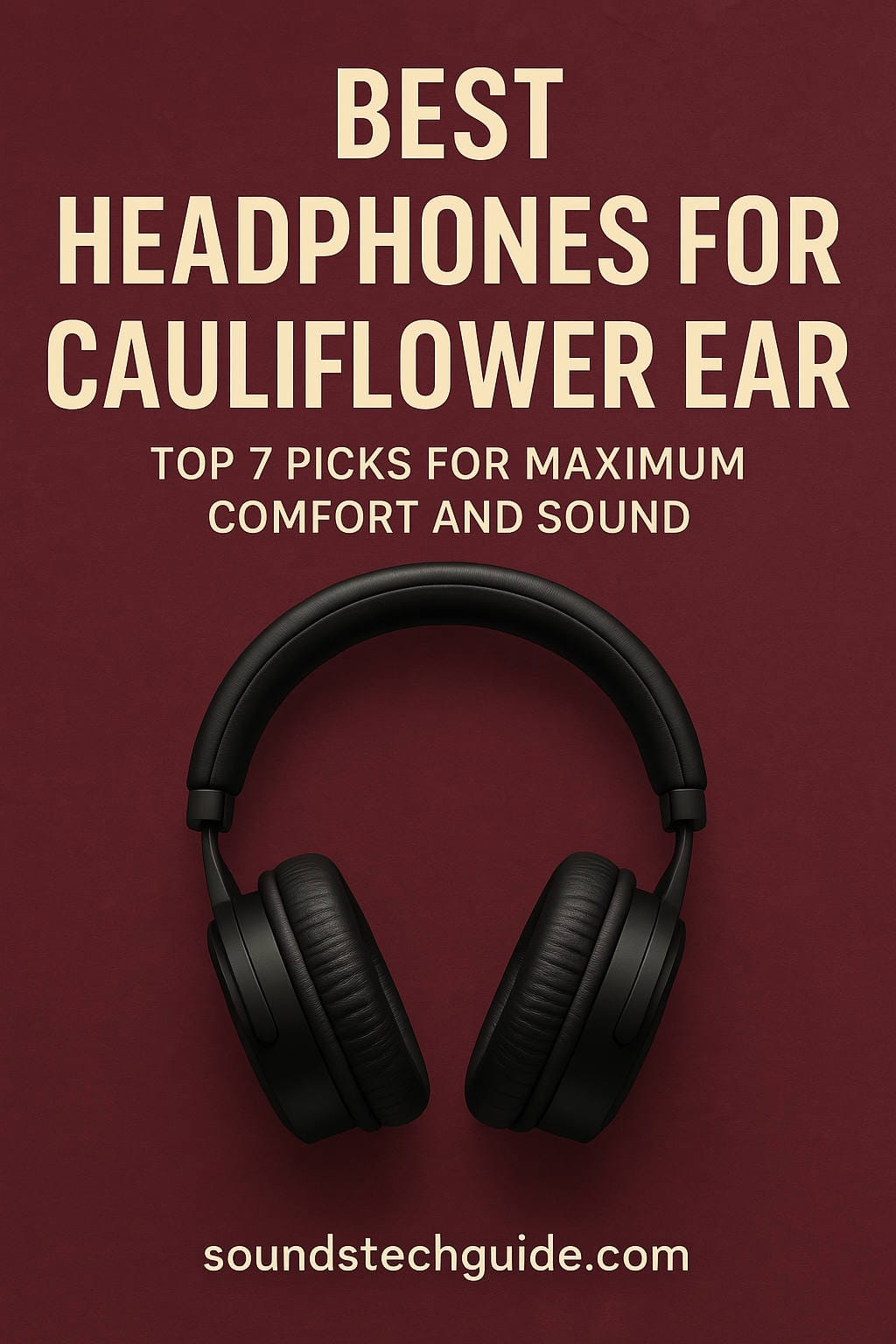For athletes and fitness enthusiasts, headphones are often a part of everyday life—whether it’s during intense workouts, runs, or moments of relaxation. But for those with cauliflower ear, finding headphones that don’t cause pain, irritation, or discomfort can be a real challenge.
Cauliflower ear, caused by repeated trauma to the ear, alters the shape and sensitivity of the ear, making traditional headphones impractical or even impossible to wear comfortably. Fortunately, the market today offers more options than ever, including bone conduction and open-ear headphones that don’t interfere with the ear canal or apply pressure to sensitive areas.
In this ultimate guide, we’ll break down everything you need to know, from how cauliflower ear affects headphone fit to the best headphones for cauliflower ear in 2025. Whether you’re an MMA fighter, wrestler, or simply someone dealing with ear sensitivity, there’s a solution here for you.
What Is Cauliflower Ear and Why Does It Matter?
Understanding the Condition
Cauliflower ear occurs when the outer ear suffers repeated trauma, commonly in contact sports like wrestling, rugby, boxing, or MMA. The trauma causes blood to collect between the ear’s skin and cartilage, which, if left untreated, leads to permanent thickening and deformity of the ear.
The Headphone Problem
Traditional headphones—especially over-ear and in-ear models—can press against sensitive cartilage or irritate swollen, scarred areas. This makes extended use uncomfortable or even painful. Choosing the wrong headphones can worsen symptoms or cause inflammation.
That’s why selecting the right style and model is critical for anyone with cauliflower ear.
Key Features to Look for in Headphones for Cauliflower Ear
Before diving into product recommendations, let’s take a look at what you should prioritize when shopping for headphones:
1. No Direct Pressure on the Ear
Avoid anything that presses directly on or inside your ear. This rules out tight over-ear and in-ear headphones. Open-ear or bone conduction headphones are ideal since they bypass the ear canal entirely.
2. Lightweight Design
Lighter headphones reduce strain and are less likely to irritate sensitive areas. Look for models made with silicone, memory materials, or titanium frames for flexibility and comfort.
3. Secure Fit
For active users, headphones need to stay in place without squeezing the head or ears. Wraparound and hook designs offer great stability.
4. Sweat and Water Resistance
Athletes need sweat-resistant gear. Choose headphones with at least an IP55 rating to handle sweat and dust without affecting comfort or durability.
5. Battery Life and Sound Quality
While comfort is the top priority, you shouldn’t sacrifice sound. Look for models that offer solid audio performance and long battery life, especially for all-day use.
The 7 Best Headphones for Cauliflower Ear (2025 Edition)
Here’s our handpicked list of headphones and earphones that work best for people with cauliflower ear. We’ve included options for all budgets and preferences—from workouts to casual listening.
1. Shokz OpenRun (Formerly AfterShokz Aeropex)
✅ Best Overall Bone Conduction Headphones
Why It’s Perfect:
The Shokz OpenRun offers the ultimate blend of comfort, sound quality, and fit for those with cauliflower ear. It doesn’t touch the ear canal and uses bone conduction technology to send audio through the cheekbones.
Specs:
- Technology: Bone conduction
- Battery: 8 hours
- Weight: 26g
- Waterproof: IP67
- Charging: Magnetic quick-charge
Pros:
- No contact with the ear at all
- Lightweight, minimalist design
- Quick charge gives 1.5 hours in 10 minutes
Cons:
- Sound quality isn’t as rich as traditional headphones
- Not ideal for bass-heavy listeners
Best For: Runners, wrestlers, boxers, or gym goers with sensitive ears
2. Sony LinkBuds
✅ Best Open-Ear True Wireless Earbuds
Why It’s Perfect:
Sony’s LinkBuds stand out with their unique open ring design that lets ambient sounds in while still delivering solid audio. The earbuds sit lightly in the ear without entering the canal—perfect for those with mild to moderate cauliflower ear.
Specs:
- Design: Open-ring drivers
- Battery: 5.5 hours (17.5 with case)
- Water Resistant: IPX4
- Controls: Touch and gesture control
Pros:
- Ambient sound passthrough for safety
- Great for calls and voice assistants
- Sleek, futuristic look
Cons:
- Not great in noisy environments
- Fit might be loose for some ear shapes
Best For: Casual listeners, office use, and everyday wear
3. Bose Frames Tempo
✅ Best Audio Sunglasses for Outdoor Use
Why It’s Perfect:
These sunglasses double as open-ear speakers, sending audio through the temples rather than the ears. Bose Frames are ideal for outdoor athletes or cyclists who need audio without sacrificing awareness or comfort.
Specs:
- Style: Audio sunglasses
- Battery: 8 hours
- Water Resistant: IPX4
- Lens Options: Polarized and interchangeable
Pros:
- Stylish and practical
- Great for sunlight and outdoor conditions
- Crisp Bose-quality sound
Cons:
- Expensive
- Not usable indoors or at night
Best For: Cyclists, runners, and outdoor training
4. Oladance Open Ear Headphones
✅ Best for Long Listening Sessions
Why It’s Perfect:
These earbuds don’t block or enter the ear canal. Instead, they rest on the outside, delivering balanced sound while staying incredibly light. With an insane 16-hour battery life, they’re great for extended wear.
Specs:
- Design: Open-ear
- Battery: Up to 16 hours
- Bluetooth: 5.2
- Water Resistant: IPX4
Pros:
- Very lightweight and secure
- Battery life beats most competitors
- Surprisingly rich sound
Cons:
- Bulky charging case
- Sound leaks at high volume
Best For: Remote workers, long flights, marathon study sessions
5. Shokz OpenMove
✅ Best Budget Bone Conduction Headphones
Why It’s Perfect:
For those who want bone conduction comfort without breaking the bank, the OpenMove delivers. It’s great for entry-level use, commuting, or lighter workouts.
Specs:
- Technology: Bone conduction
- Battery: 6 hours
- Weight: 29g
- Waterproof: IP55
Pros:
- Great price
- Durable and flexible
- USB-C charging
Cons:
- Slightly lower audio quality
- Less battery life than premium models
Best For: Students, new users, and budget-conscious athletes
6. AfterShokz Titanium
✅ Best for Durability and Workout Stability
Why It’s Perfect:
The Titanium was one of the early models that proved bone conduction headphones could work well in the gym. Its wraparound design and snug fit ensure it stays in place during vigorous activity.
Specs:
- Battery: 6 hours
- Water Resistant: IP55
- Frame: Titanium band
Pros:
- Highly durable
- Secure fit for any workout
- Sweat-resistant
Cons:
- Older model
- Bulkier than newer designs
Best For: CrossFit, wrestling training, heavy lifters
7. NANK Runner Diver
✅ Best for Swimmers with Cauliflower Ear
Why It’s Perfect:
Yes, even swimmers with cauliflower ear can enjoy music. The NANK Runner Diver is a waterproof bone conduction headset with MP3 mode, perfect for pool sessions.
Specs:
- Waterproof: IP68
- Storage: 16GB MP3 built-in
- Battery: 10 hours
- Bluetooth: 5.3
Pros:
- Works in water without Bluetooth
- Comfortable, open-ear design
- Strong bass for a bone conduction device
Cons:
- MP3 file transfer required for swimming use
- Not suitable for underwater calls
Best For: Swimmers, triathletes, and those who want full waterproof function
Comparison Table – At a Glance
| Product | Type | Contact with Ear | Battery | Price Range | Best For |
|---|---|---|---|---|---|
| Shokz OpenRun | Bone Conduction | No | 8 hrs | Check Prices in Amazon | Best Overall |
| Sony LinkBuds | Open-Ear TWS | Minimal | 5.5 hrs | Check Prices in Amazon | Office/Casual |
| Bose Frames Tempo | Audio Sunglasses | None | 8 hrs | Check Prices in Amazon | Outdoor Sports |
| Oladance Stereo | Open-Ear | Minimal | 16 hrs | Not Available | Long Listening |
| Shokz OpenMove | Bone Conduction | No | 6 hrs | Check Prices in Amazon | Budget Pick |
| AfterShokz Titanium | Bone Conduction | No | 6 hrs | Check Prices in Amazon | Intense Workouts |
| Nanka Runner Diver | Waterproof Bone Conduction | No | 10 hrs | Check Prices in Amazon | Swimming |
How to Wear Headphones with Cauliflower Ear: Pro Tips
Even the best headphones need proper care and usage. Here are a few tips to ensure you maximize comfort:
1. Avoid Extended Pressure
Give your ears breaks between long listening sessions. Even open-ear designs can cause strain if used non-stop.
2. Use a Clean, Dry Environment
Keep both your ears and the headphone surface clean and dry, especially after workouts.
3. Choose the Right Size
Some headphones come with customizable bands or adjustable frames. Make sure the fit doesn’t rest against swollen or hardened parts of your ear.
4. Pair with Ear Protectors (if needed)
During recovery, you might want to wear soft protectors or wraps to prevent further trauma while listening to music.
5. Store Properly
Always store headphones in a case to prevent unnecessary pressure or damage.
FAQs: Best Headphones for Cauliflower Ear
❓ Can headphones make cauliflower ear worse?
Yes, if they press tightly against damaged cartilage or introduce bacteria. Always opt for open-ear, bone conduction, or lightweight headphones.
❓ What’s the most comfortable type of headphones?
Bone conduction headphones are the most comfortable for cauliflower ear sufferers since they completely avoid ear contact.
❓ Can I still wear earbuds with cauliflower ear?
If the case is mild, some open-fit earbuds may work. However, it’s best to avoid anything that inserts into the canal.
❓ Do bone conduction headphones sound good?
They’ve improved dramatically in recent years. While they lack deep bass compared to premium over-ear models, they offer great clarity and practical listening quality.
Final Thoughts: Choose Comfort Without Compromise
Cauliflower ear doesn’t mean you have to give up on high-quality audio or settle for uncomfortable gear. Thanks to innovative designs like bone conduction, open-ear, and audio sunglasses, you now have headphones that are comfortable, safe, and sound amazing.
Whether you’re hitting the gym, cycling outdoors, working from home, or even swimming laps, there’s a headphone on this list that can meet your needs without aggravating your ear condition.
Take the time to choose wisely—and let your ears thank you for it.

